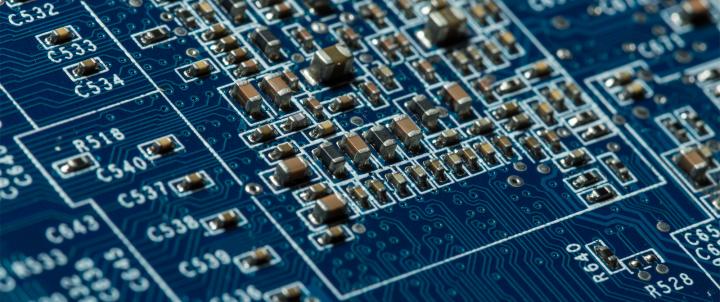
About this Program
This program is ideal for individuals who want to acquire or update their skills in cutting-edge computer science technologies – and tackle the challenges inherent in capturing, storing, sharing, transferring and analyzing data.
Program Overview
Tuition & Fees
Funding Opportunities
Hood College’s Master of Science in Computer Science program offers students a distinctive blend of academic rigor, hands-on learning, and career-ready skills that set them apart in competitive job markets—both in the U.S. and globally.
A Program Rooted in Real-World Application
Hood College has been a pioneer in computer education since 1970 and launched its standalone MS in Computer Science program in 2005. The program focuses on preparing students to advance professionally, solve complex problems, and act ethically in today’s digital society.
With focus areas in AI and Data Science and Cybersecurity, students can tailor their learning to match their career goals. The 33-credit program includes core courses in software engineering, data science, AI/ML, and cybersecurity, complemented by electives in emerging fields like deep learning and cybersecurity.
Career-Driven Outcomes
Graduates of the program have secured positions at top employers such as Lockheed Martin, Life Technologies, and Boeing. According to the program’s 2021 alumni survey, respondents reported full-time employment, many in high-paying, impactful roles. The program has a strong track record of placing both domestic and international students, with a high degree of OPT placement for international graduates.
Hood’s proximity to the I-270 tech corridor further enhances career opportunities. Students gain hands-on experience through CPT (Curricular Practical Training), internships, and real-world projects that bridge the gap between classroom learning and industry needs.
Instruction from experts
Faculty members are specialists in data science, artificial intelligence (AI), cybersecurity, software engineering, computer architecture, machine learning, health informatics and more. They bring their expertise into the classroom, sharing in-depth knowledge and practical experience in a contemporary context. Advanced courses in emerging areas — such as artificial intelligence, high-performance computing, quantum computing and data mining — build on mastery gained in algorithm analysis, operating systems, computer architecture and other core requirements.
The advisory board for this program includes members of companies such as Leidos, the NSA, Microsoft Federal, and Red Hat.
Specialized
Thanks to small classes and readily available faculty, students can count on personal attention and advice when selecting the courses and the specialty track that best suits their career goals. The elective sequence may include a thesis, fieldwork or software engineering project. With the careful selection of electives, students may use their electives for our focus areas in AI and Data Science or Cybersecurity, or potentially earn the Certificate in Cybersecurity. Additionally, evening classes accommodate daytime work schedules.
Make connections
Hood is strategically located at the top of Maryland’s technology-rich I-270 corridor. Lockheed Martin, Life Technologies, Boeing and NIST and are just a few of the leading-edge businesses and government agencies in the region that look to Hood’s computer science program for highly qualified job candidates.
Degrees Offered
- MS
Are you ready to go further?
For students applying to the computer science program, please submit the following to the Graduate School:
- One copy of official transcripts from each institution of higher education attended.
- A résumé of work experience.
Applicants to the graduate program in computer science are expected to have a strong background in computer science and mathematics.
Four foundation courses introduce students to algorithms and programming, computer organization and design, advanced data structures and discrete mathematics. Students holding a baccalaureate degree in computer science will normally be exempted from all foundation courses. Other students may, upon review by the department, be exempted from some or all of the foundation courses. The program director determines the required foundation courses or exemptions based on a thorough evaluation of transcripts and other supporting documents. The objective is to ensure the student is well prepared and ready to succeed in the program.
Transfer credit policy for admitted students
Students may transfer a maximum of 6 graduate credits from an external, accredited institution, or another Hood graduate program prior to the first semester of study in the current program. Please review the full graduate transfer credit policy in the College catalog.
A student must complete 33 credits beyond prerequisite courses, including 15 credits of Core requirements. The Core courses represent the general body of knowledge and skills that all students in the program are expected to master.
Students in this program should use this Program Planning Guide (PDF) to plan and track their progress.
Foundation Courses
The foundation courses represent background knowledge and skills necessary for successful completion of degree requirements. Some or all of the foundation courses may be waived by the program director, based upon an analysis of the student’s previous work. A student holding a baccalaureate degree in computer science will normally be granted exemption from, but not graduate credit for, all foundation courses. Any foundation courses required are in addition to the 33 credits required for program completion.
| MATH 505 | Discrete Math | 3.0 |
| CS 508 | Computer Organization and Design | 3.0 |
| CSIT 512 | Elements of Computer Programming | 3.0 |
| CS 519 | Advanced Data Structures | 3.0 |
Core Requirements
| CS 520 | Algorithm Analysis | 3.0 |
| CS 524 | Principles of Software Engineering | 3.0 |
| CS 528/CS 428 | Artificial Intelligence | 3.0 |
| CS 564/CS 464 | Operating Systems | 3.0 |
One of the following courses:
| CS 561/CS 461 | Computer Architecture | 3.0 |
| CS 571/CS 471 | Programming Languages: Their Design and Compilation | 3.0 |
Students must complete 18 credits of elective work, which may include a 6-credit thesis (CS 580), 6-credit field work project (CS 585) or a 6-credit software engineering project (CS 595). All elective courses must be chosen from CS or CSIT prefixed coursework. Students may use their electives for one of our focus areas in AI and Data Science or Cybersecurity.
Focus Areas:
| AI and Data Science | ||
| CS 527 | Data Science | 3.0 |
| CS 543 | Machine Learning | 3.0 |
| CSIT 565 | Big Data and Database Systems | 3.0 |
| CS 570 | Foundational Models and Generative AI | 3.0 |
| Cybersecurity | ||
| CSIT 555 | Information Systems Security | 3.0 |
| CSIT 548 | Telecommunications & Networking | 3.0 |
| CSIT 534 | Network and Internet Security | 3.0 |
| CSIT 532 | Computer Forensics | 3.0 |
| Choose one of the courses below: | ||
| CSIT 566 | Ethical Hacking | 3.0 |
| CSIT 537 | Applied Encryption & Cryptology | 3.0 |
A Distinctive Hood Experience
Hood College offers more than just technical training. Its mission to integrate liberal arts and professions ensures that students graduate not only as competent computer scientists but as thoughtful leaders prepared to make a positive impact.
The MS in Computer Science program is deeply embedded in this ethos. Through experiential learning, ethical practice, and a commitment to diversity and inclusion, it cultivates graduates who are ready to lead a complex, tech-driven world.
Graduates earning a master's degree in computer science from Hood College:
Select and apply appropriate programming and knowledge paradigms through:
- Applying algorithmic design paradigms and methods of analysis to solve computational problems; and
- Differentiating between programming language paradigms and selecting a specific programming language to implement a solution.
Possess in-depth knowledge of hardware/software/networks and systems integration through:
- Analyzing the trends and impact of modern computer architectures; and
- Integrating concepts and techniques involving hardware, software and networking.
Demonstrate understanding of the fundamental nature of data through:
- Constructing and validating artificial intelligence systems.
Practice modular software design through:
- Applying design and development principles in the construction of software systems of varying complexity.
Demonstrate effective professional skills including teamwork, utilization of information resources, and communication with technical and nontechnical audiences through:
- Working effectively as part of a team;
- Classifying and solving generally stated problems;
- Identifying and using professional information resources;
- Monitoring current trends and directions in the field; and
- Communicating effectively with technical and non-technical audiences.
Additional Information
18-24 Months
Average Completion Time
33 Total Credits
| Median Salary (Public Data) | Job Titles (Alumni Data) | Companies of Employment (Alumni Data) |
|---|---|---|
| $114,000 | Computer Scientist | National Institute of Standards and Technology |
| Software Engineer | Cisco | |
| Logistics Officer | United States Army | |
| Principal Engineer | Hughes Network Systems | |
| Automation Data Engineer | Frederick National Laboratory for Cancer Research | |
| Salesforce Lightning Developer/Administrator | ADT |
Program Contact

Program Director

Assistant Director of Graduate Admission

Graduate Student Spotlight | Anoushka Kondoj
“The supportiveness of people, like Amani Al-Dajane and Dean Boulton, really influenced me to choose Hood College for my master's degree.”

Graduate Student Spotlight | Tom Darby, Computer Science
"Hood College is giving me a golden opportunity to simultaneously refresh my existing knowledge while introducing me to entirely new fields of study"

How Hood’s computer science degree can help in building your career
Computer science graduate Matt Roberts works as a software engineer.







